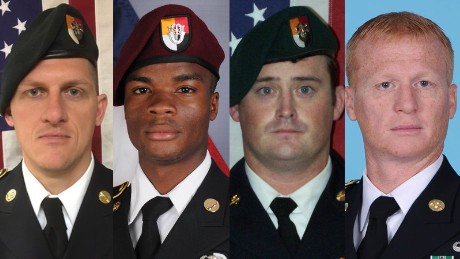Story highlights
- "We honor our troops, every one of them, every life is critical," Mattis added
- Experts working for US Africa Command are trying to establish an hour-by-hour timeline of what happened
Washington (CNN)Defense Secretary James Mattis said Thursday that the "US military does not leave troops behind," but did not offer specific details about why the body of Sgt. La David Johnson was recovered nearly 48 hours after his 12-member team was ambushed by ISIS fighters in Niger two weeks ago.
Mattis also told reporters not to question the troops who were in the battle about how the soldier was separated and left behind.
"The US military does not leave our troops behind, and I would just ask you not question the actions of the troops who were caught in the firefight and question whether or not they did everything they could in order to bring everyone out at once," he said.
"We honor our troops, every one of them, every life is critical," he added.
Joint Staff Director Lt. Gen. Kenneth F. McKenzie told reporters Thursday that US, French and Nigerien forces "never left the battlefield" until Johnson was found.
National security adviser H.R. McMaster said Thursday that he had to defer to the Department of Defense on questions about where the investigation stands and why Johnson's body was left behind.
"All that will come out," he said. "There is a full investigation, and the investigation really has a couple of aims. One is to inform the American people, inform the Congress, inform across our government as to what really happened."
That should yield "a high degree of clarity, a common understanding," McMaster said.
Experts working for United States Africa Command are trying to establish an hour-by-hour timeline of what happened as part of a comprehensive investigation that includes all the military branches and elements of US intelligence agencies involved in the mission.
Officials who have spoken to CNN have cautioned that new information is likely to emerge as the investigation continues, and their understanding of what happened could change.
The Defense Department has identified all four service members killed in the ambush near the Niger-Mali border by up to 50 fighters from ISIS in the Greater Sahara, a US official said. It is the deadliest combat mission of Trump's short presidency to date.
Johnson, Staff Sgt. Bryan Black, Staff Sgt. Jeremiah Johnson and Staff Sgt. Dustin Wright died as a result of the October 4 attack after helping local forces in Niger combat terrorists.
White House chief of staff John Kelly also stressed the importance of allowing the investigation to play out when asked about the Niger attack at the White House briefing on Thursday.
"The fact is they need to find out what happened and why it happened," Kelly said
"Investigation doesn't mean anything was wrong. An investigation doesn't mean people's heads are going to roll," he added.
Three senior US defense officials told CNN on Wednesday that Mattis is dismayed at the lack of detailed information he has received about the attack, but there is no indication he is trying to unduly hurry the investigation being carried out by Africa Command, according to all three officials -- all of whom are in a position to have knowledge of how Mattis views the situation.
Mattis did attempt to answer questions Thursday over why the military's own intelligence said it was unlikely the team would run into opposition forces.
"In this specific case, contact was considered unlikely, but there's a reason we have US Army soldiers there and not the Peace Corps -- because we carry guns," he said. "It's a reality. It's part of the danger that our troops face in these counterterrorist campaigns. But remember we do these types kinds of missions by, with and through allies. It is often dangerous."
Sen. John McCain said Thursday that he might seek a subpoena in order to receive the information he wants surrounding the attack in Niger.
"It may require a subpoena," McCain told CNN's Suzanne Malveaux on Capitol Hill when asked what steps he would be willing to take to receive the information he's demanding.
The Arizona Republican argued Wednesday that the Trump administration is not being forthcoming about the attack.
Asked how he felt about McCain's criticism, national security adviser H.R. McMaster said, "It hurt my feelings.
"I love and respect Sen. McCain," McMaster said, adding that "if Sen. McCain says we need to do a better job communicating with him ... we're going to do it."
White House spokeswoman Sarah Sanders was asked Wednesday whether Trump was satisfied with the information he has received about the mission and ambush.
"I believe they're still looking into the details of that," Sanders replied. "But I don't think that the President can ever be satisfied when there's loss of life from men and women in uniform."








